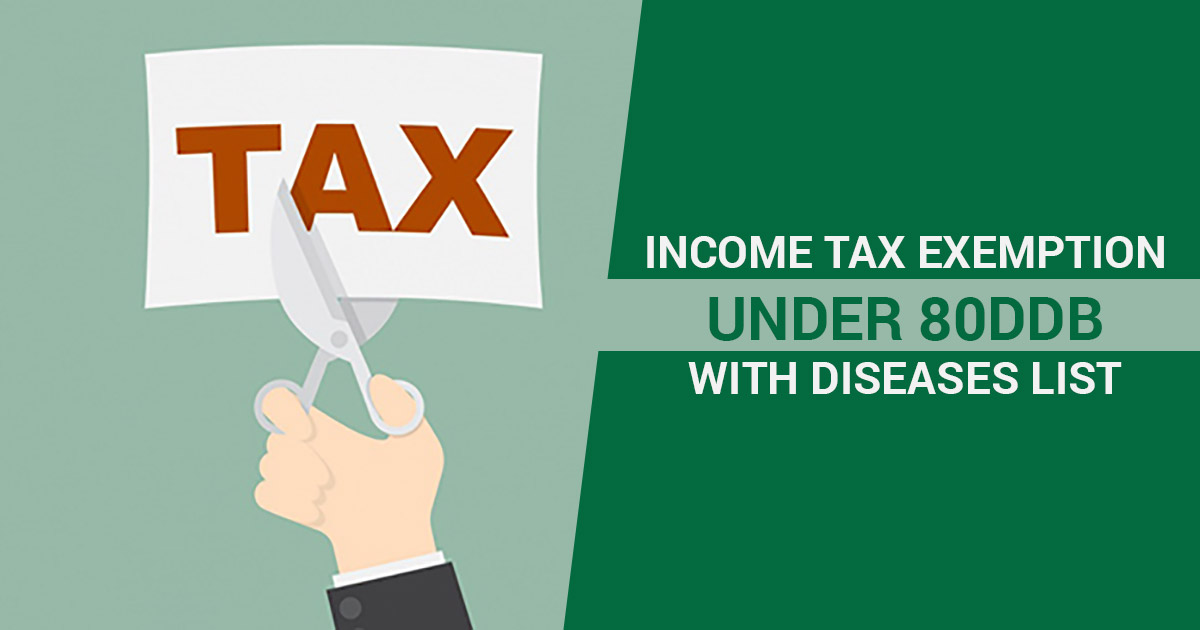Under section 80D of the Income Tax Act, Tax deduction on Health Insurance premiums confirms the exemption on the premium paid for the health policy taken for himself or the children.
Yet there is another technique to save taxes, which has nothing to do with the premium payment on the health insurance policy. This exemption can be claimed under Section 80DDB from the gross total income prior to the calculation of taxable income, which results in lower tax liability due to reduced taxable income.
However, this deduction includes the expenses incurred on the treatment of only special diseases. To claim a deduction under section 80DDB, let us have a brief knowledge about this act:
Eligibility to Claim the Deduction Under 80DDB
Any person living in the country or a Hindu Undivided Family (HUF) is eligible to claim a deduction under Section 80DDB, which implies that non-resident Indians (NRIs) can not claim this deduction. Under the law, the spouse, children, parents, brothers, and sisters come under the purview of the dependent member and are eligible to claim their medical expenses. In the case of a Hindu undivided family, it can be claimed as a member of the HUF.
The deduction under this section is available only on the cost of treatment of special diseases, which are as follows:
- Cancer
- AIDS
- Kidney failure
- Haemophilia
- Thalassemia
The deduction claim can also be made in the case of mental illnesses given below. However, the level of disturbances should be 40 per cent or more:
- A neurologic disease that has been certified with a disability level of 40% or more:
- Dementia
- Dystonia Musculorum Deformans
- Motor Neuron Disease
- Ataxia
- Chorea
- Hemiballismus
- Aphasia
- Parkinson’s Disease
- Malignant Cancers
- Full Blown Acquired Immuno-Deficiency Syndrome (AIDS)
- Chronic Renal Failure
- Hematological disorders
- Hemophilia
- Thalassaemia
Chetan Chandak, head of tax research at HR and Block, says that the diseases that are not given in the rule cannot be deducted under Section 80DDB.
Read Also: Section-Based Tax Saving Tips and Guide For Salaried Persons
How Much Can Be Claimed?
According to the existing rules, the amount of the claim depends on the age of the person:
- If the expenditure is being made on a person under 60 years, then they can claim a deduction up to Rs 40,000.
- If the sick person is above 60 years of age, then a deduction of up to one lakh rupees can be claimed.
The amount is reduced from the claim on the receipt of reimbursement from the institute or the insurance company.
What is the Procedure for Obtaining this Certificate?
- The specialist can provide the certificate as per the table:
- Patients are not required to obtain a certificate from a government hospital when taking treatment in a private hospital
- A full-time specialist is needed to take the certificate when taking treatment from the government hospital, and the specialist should have a postgraduate degree in General Medicine or an equivalent degree as per the Medical Council of India (MCI).
- No need for a Certificate in Form 10I
- The certificate must include the age and name of the patient, the disease or ailment, the address registration number and the specialist qualification of the prescription
- If the treatment is taken from a government hospital, then it must have the address and name
